Education shapes the future of nations, particularly in developing regions. Here, it fuels economic growth and sparks new ideas. Schools build strong communities and teach us how to care for our earth.
More kids now sit in classrooms than ever before a big step forward. Nonetheless, simply attending school doesn’t mean students learn well; this is what recent studies have shown. To end deep poverty, these countries must invest wisely in education to overcome serious learning gaps and equip young people with vital skills for modern life challenges.
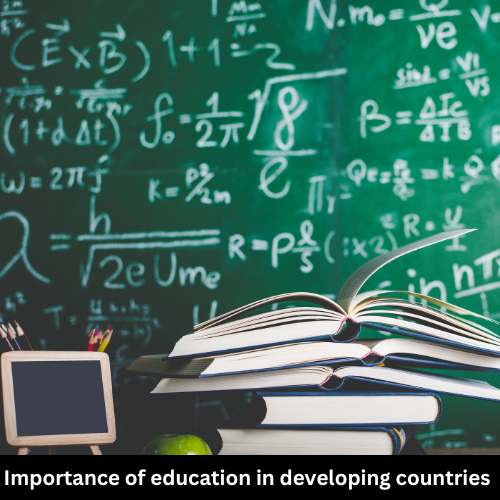
Understanding Education in Developing Nations
In developing nations, education shapes the future. Beyond filling a classroom, it’s about what happens inside. Even with more kids in school than ever before, there’s a crisis: many can’t read simple text by age ten the essence of Learning Poverty.
Imagine 70% stuck in this trap since COVID-19 hit; that’s our reality now. Countries face an urgent call to action standard methods won’t fix these deep-set issues worsened by pandemic losses nor meet SDG 4 goals for quality education. Special programs are paramount to not only return children back to classrooms but also rebuild stronger systems for all learners’ benefit.
This issue is vast and touches on economic stability as learning gaps might cost us up to US$21 trillion over lifetimes if we fail them now, it ripples globally tomorrow.
Read More : The Power of Education: Why Learning Matters
Key to Poverty Reduction
Education serves as a powerful tool to cut poverty rates. When kids learn to read, 171 million could escape extreme lack of wealth. That’s like cutting the globe’s total by 12%.
Better learning can dial back absolute poverty by one-third. More schooling means more money for each person about 10% extra earnings per year spent in school. If those with less access got similar education as richer individuals, working poor gaps might shrink by nearly two fifths.
It’s clear: countries grow when their people get schooled, proven across continents over decades. By boosting knowledge now, we set up a future where fewer face hardships and economies thrive.
Boosting Economic Growth
Education ignites a spark in young minds, shaping them to tackle daily life and opening doors to new opportunities. A sound primary education bestows upon children the tools for problem-solving and economic participation. It lays down foundations that can drive a nation’s wealth higher, break cycles of poverty, level gender disparities, and bolster social progression.
In developing countries where futures often seem uncertain due to conflicts or disasters, schools become more than knowledge hubs they turn into beacons of hope offering safe spaces away from violence or coercion by dangerous factions. On an individual scale, learning lifts people up enhancing confidence as well as potential income levels which ripples outwards fostering institutional strength and spurring inventiveness within society. Yet despite these profound impacts on societal growth both at micro-and macro economic scales there remains a daunting challenge: millions linger without access to even basic schooling a barrier which if broken could see vast reductions in global poverty numbers.
Empowering Women and Girls
Empowering women and girls is crucial in places where the daily fight for food, water, and a safe place to sleep takes center stage. In Tajikistan’s shaky schools with roofs needing fix or lights too dim, many young girls miss out on learning due to cold rooms or no toilets just for them. Central Asia Institute steps up here; they find needy spots and put their hearts into mending these gaps.
The group has raised new schools since 2012 four bright havens standing in Tajikistan’s hard to reach lands. They’re solid against nature’s rage, filled with light that invites all kids to read and write safely. We create safe spaces where teachers want to stay, teaching future leaders.
This shapes lives, one girl at a time, fueling change across nations.
Improving Health Outcomes
Good health goes beyond not being sick. People need safe places to live, away from harm and stress that crime brings. Fear keeps people indoors, affecting their physical shape badly like making some people more likely to be overweight.
Education plays a huge part in this picture because it’s tightly tied with how well we can stay healthy. Those who learn more often live longer, healthier lives than others less schooled. This is key for experts trying to close gaps in wellness among communities; they see learning as something that shapes our health big time.
Enhancing Social Stability
Education in less wealthy countries lifts people up. It helps to make strong communities where individuals work together better. When most can read and do numbers, they help keep peace in their area.
Schools teach kids how to solve problems without fighting. This way, streets are safer for all. Good schools mean more jobs too because companies want smart workers.
People with good jobs often stay out of trouble and care about their neighbors more instead of just themselves. So by teaching everyone, these places get calmer day by day as each person learns not only books but also how to live well with others.
Bridging the Digital Divide
In schools like those in Marion and Phoenix, the ConnectED initiative has brought tech to classrooms. Yet gaps remain once kids leave school; internet at home isn’t as common. Libraries and other places lack what’s needed too.
We must look beyond just schools: these community spots need help for real change. Federal funds have given billions over years to such schooling programs, with added gifts from companies and charities alike. But they’re parts of a bigger puzzle involving our towns’ hearts – their public spaces that now fall short digitally.
Two cities improved learning in class with Apple’s ConnectED tools. However, students struggled to apply this knowledge at home or on the streets, where digital resources were limited. To mend this break between education settings and everyday life places needs more than just classroom aid; we want fresh ideas so everyone gets a slice of today’s e-connected world no matter where they live or learn.
Fostering Innovation and Creativity
In places like Singapore and Korea, schools put big thoughts into making kids think sharp and dream up new things. In Korea since 2009, classes aim to grow creative minds with almost a tenth of time for hands-on projects. Singapore wants its students not just book-smart but also tough in hard times, full of ideas, good at talking out their plans.
At Haig Girls’ School in Singapore you can see these goals turn real. Kids there don’t just learn; they make stuff happen! They even came up with a smart one-hand way to shut an umbrella on rainy days – thanks to them putting magnets where usually only little press-studs were used before!
To get serious about teaching how to dream big and invent cool stuff the next move is assessing it the right way. So now both countries changed their tests so that teachers know it matters and then teach it better too. Research shows when we check if kids are learning this kind of thinking well it’s clear what being creative really means more than ever before!
That helps everyone: teachers guide smarter; learners climb higher toward bright ideas made real a journey still ongoing but already bringing great change!
Catalyst for Political Engagement
Education shapes active citizens. Studies show that knowing about politics boosts engagement in democracy. People with more education tend to join community groups and vote more often.
Classroom lessons on civics can indeed grow our political understanding. This learning helps people grasp their role, rights, and duties within a nation’s fabric. Groups say civic knowledge prompts action knowledge must come first for one to act well in society’s drama of governance and ideas exchange.
When schools teach this effectively, learners feel ready to dive into the thick of public affairs with confidence. In sum: Gain wisdom; amplify your voice in shaping tomorrow’s policies.
Investment in Future Generations
Investing in future generations through education takes time and effort. Developing nations often see slow progress due to low investment levels in schools, teachers, and learning materials. Take Haiti as an example where nearly 80% of educators haven’t got the needed training before they begin teaching.
These issues create a cycle that’s hard to break poor education leads to less interest in teaching careers among skilled people. Yet, overcoming this is vital; otherwise whole generations risk falling behind without the right knowledge or skills for tomorrow’s challenges. Strong commitment from all sides is needed alongside innovative solutions aimed at scalable change.
Global Participation and Competitiveness
Education shapes the competitive edge a nation holds globally. In Europe, deep analysis reveals that countries with higher education levels drive stronger economies and more sustainable practices. Universities are key players here they boost skills, push out new science ideas, train in sharp thinking.
As such policies favoring better schools can lift a country’s development status up high. Studies show this truth; they track data from European Union states to see it clear as day: good education means strong competition for all nations big or small. It’s vital then that decision-makers look at these results closely education isn’t just books and tests it’s our future economy dancing on today’s choices.
Education stands as a cornerstone for progress in developing nations. Through learning, individuals gain critical skills that drive economic growth and foster innovation. Education breaks the shackles of poverty by opening doors to better jobs and opportunities.
It empowers communities, promotes equality, especially among women and minorities, plus it strengthens governance by minting informed citizens who can make wise choices for their future. Thusly empowered through education’s transformative power are the societies which become more robust against challenges they face on their path toward sustainable development.
Importance of education in developing countries slides
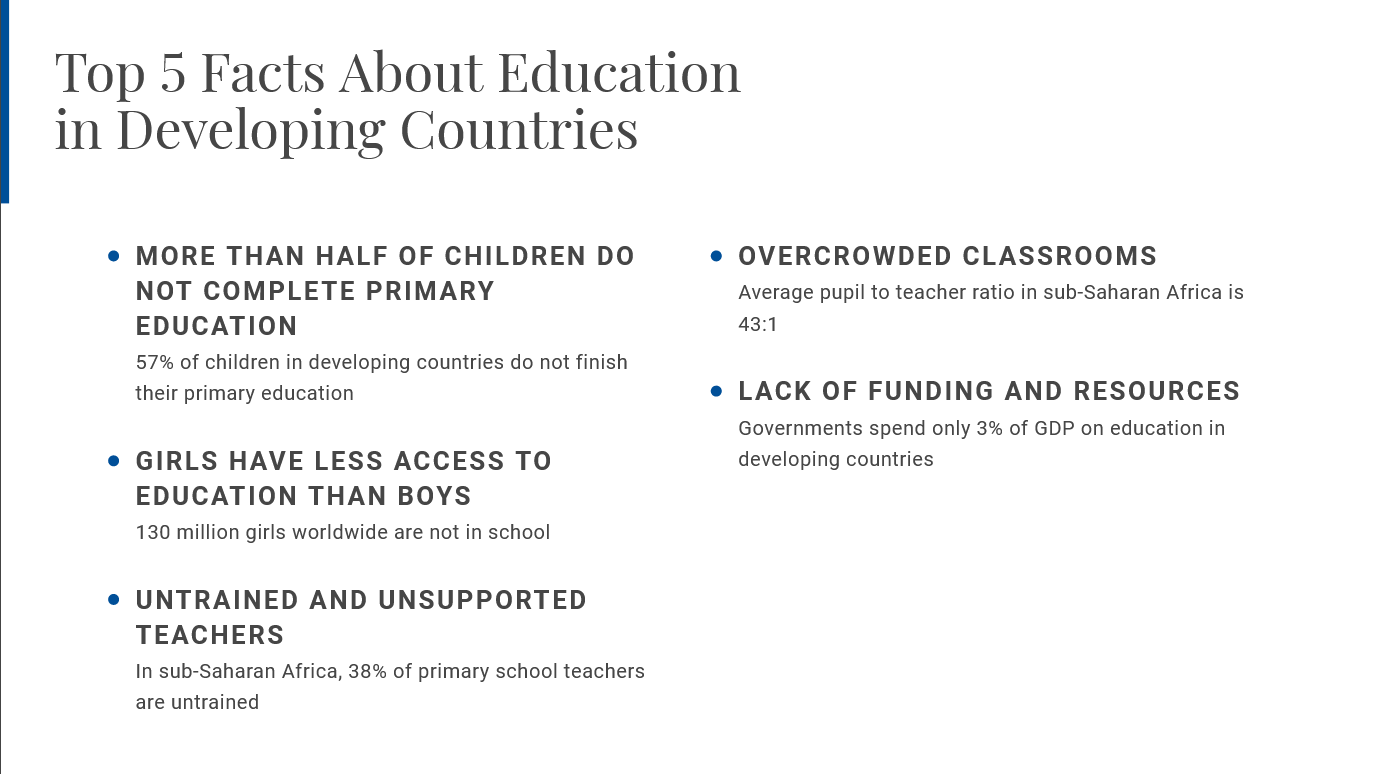
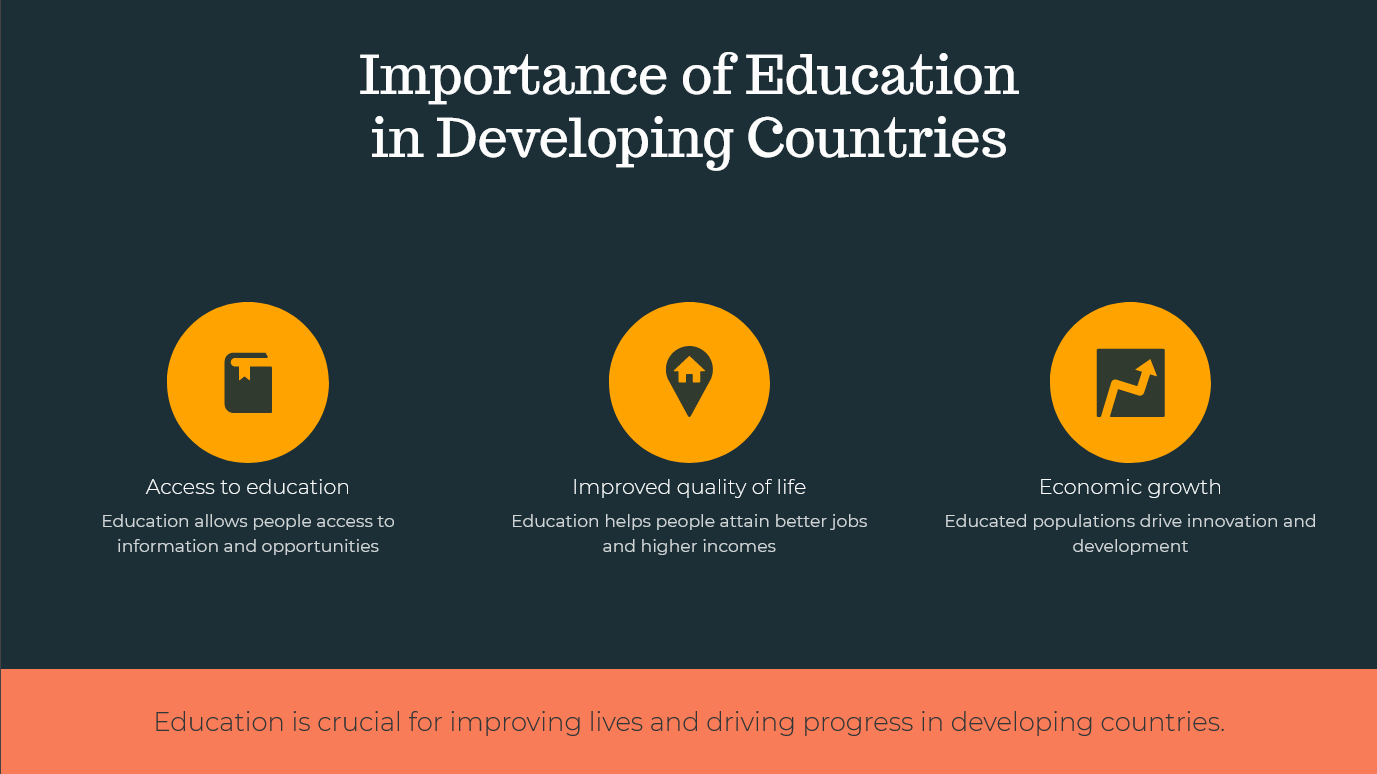
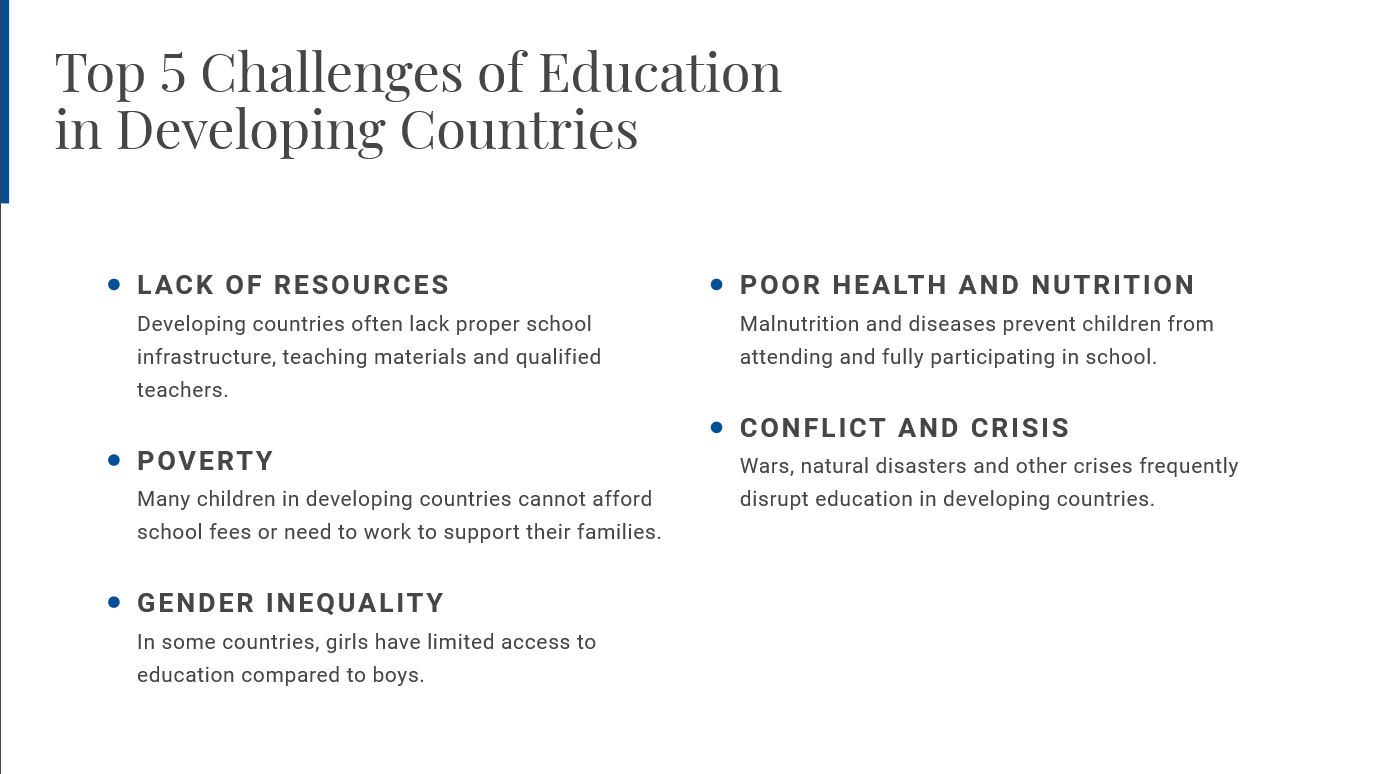
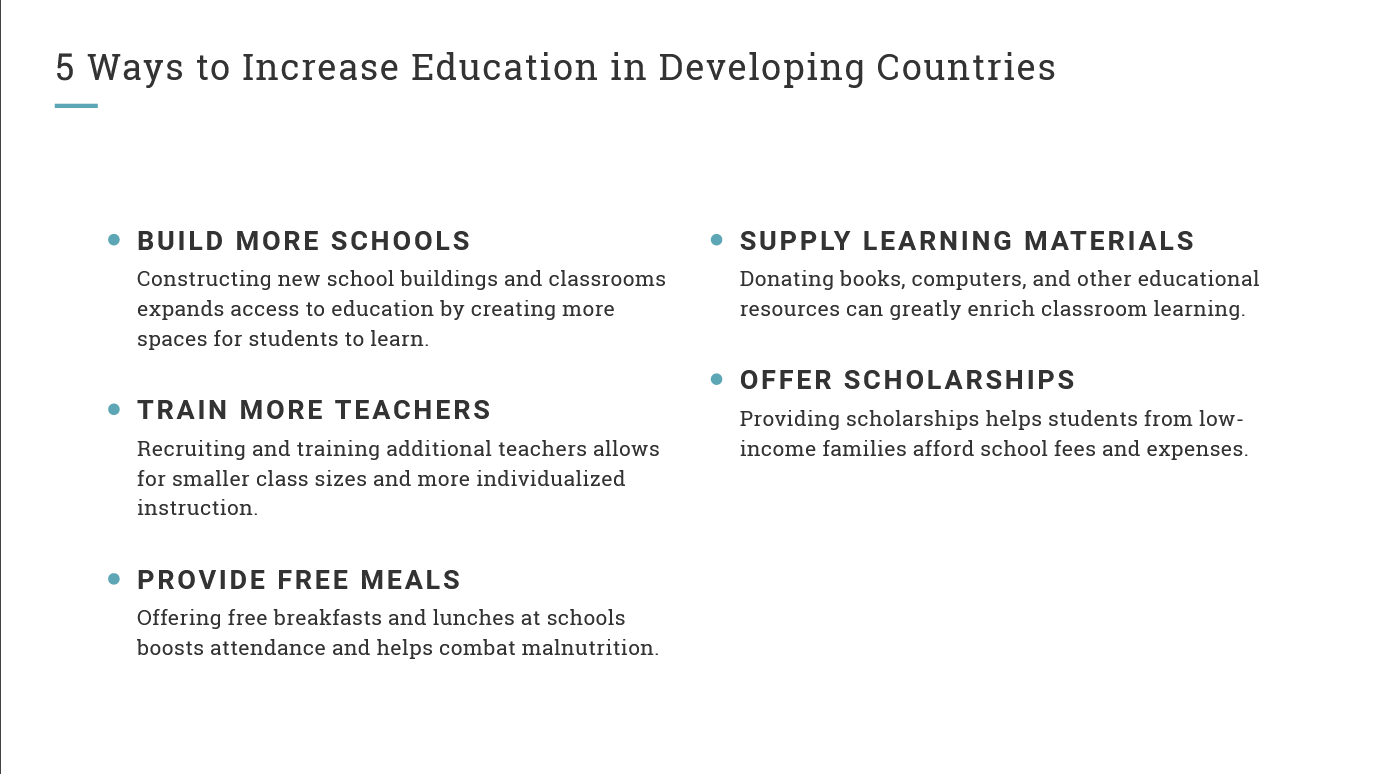
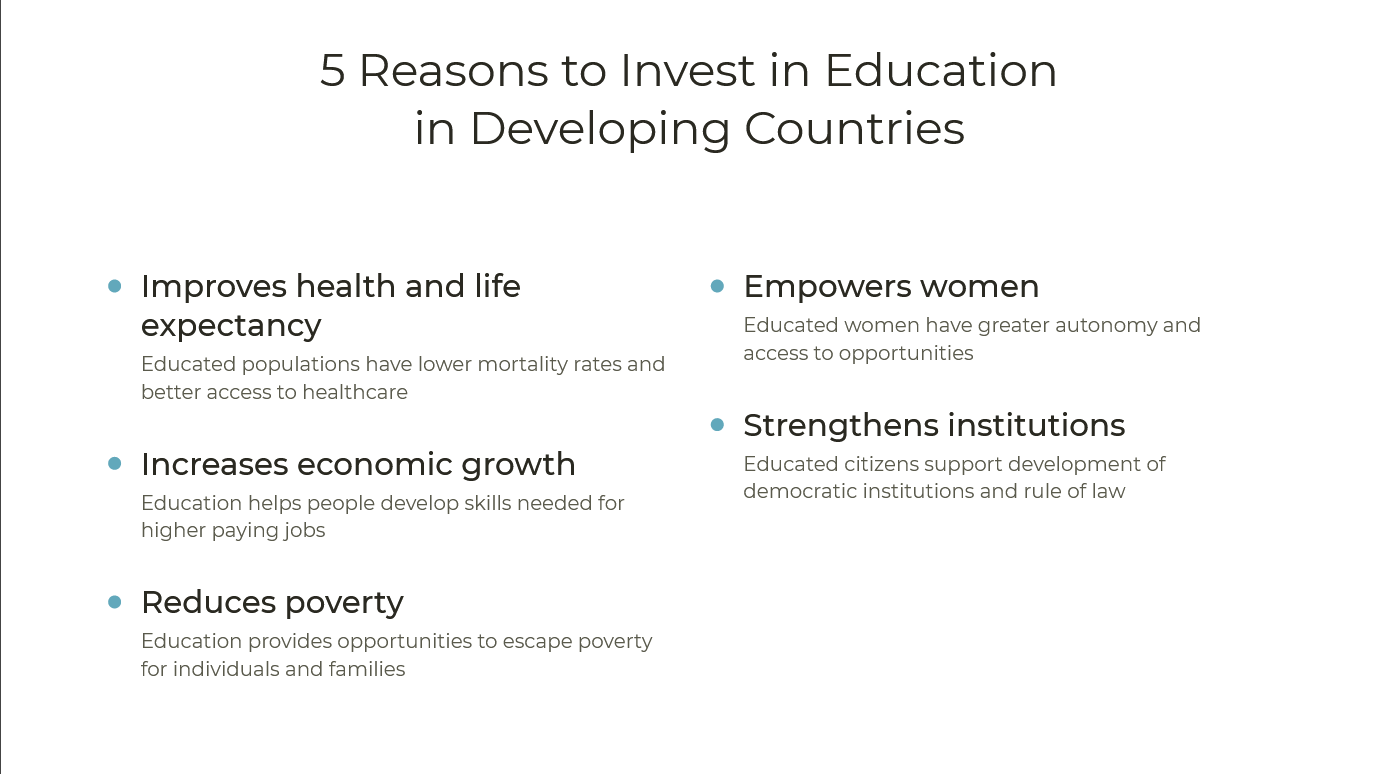
References:
https://www.worldbank.org/en/topic/education/overview
https://www.globalpartnership.org/blog/5-ways-education-can-help-end-extreme-poverty
https://brothers4change.com/en-ch/blogs/nieuws/the-role-of-education-in-developing-countries
Improving Girls’ Education in Developing Countries: Creating a Better Future, One Life at a Time
https://publichealth.tulane.edu/blog/social-determinant-of-health-education-is-crucial/
https://www.worldbank.org/en/topic/education
https://www.edweek.org/teaching-learning/opinion-creativity-in-schools-what-countries-do-or-could-do/2013/04
https://www.researchgate.net/publication/228748859_Political_knowledge_political_engagement_and_civic_education
https://p4hglobal.org/p4h-blog/2019/10/14/why-is-it-so-hard-to-improve-education-in-developing-countries
https://www.mdpi.com/2071-1050/12/16/6607